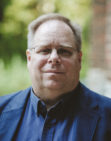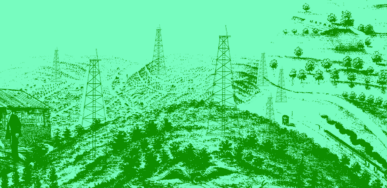The Letter of the Law
Martien Halvorson-Taylor [00:00:00] I'm Martien Halvorson-Taylor.
Kurtis Schaeffer [00:00:02] And I'm Kurtis Shaeffer.
Martien Halvorson-Taylor [00:00:03] And this is Sacred and Profane. Kurtis and I are both professors of religious studies at the University of Virginia. And on this show, we explore how religions are a part of our daily and public lives, often in ways that we hadn't imagined. In the past, we've covered everything from the cultural power of an edict issued by Cyrus the Great over 2000 years ago to the rise of robots in Buddhist and Hindu temples, which had been left short staffed by the COVID-19 pandemic.
Kurtis Schaeffer [00:00:39] We cover a lot of ground, and this season we’ll be focusing on the ways religions are a foundational part of Americans’ relationship to the environment and to climate change. There is so much good journalism covering human impacts on the land, the environment and the global climate—about the effects of fossil fuel use on our ecosystems and personal health, about the irrefutable science that shows how the impacts of global heating will only grow more extreme until we are able to use as little carbon as possible; about the people working to ensure there is a livable future for everyone on Earth.
Martien Halvorson-Taylor [00:01:18] We've noticed that religion is sometimes treated as an afterthought in that reporting—as a force that reacts to the environment but doesn't have the power to shape our physical reality. That couldn't be further from the truth, as we'll hear in the upcoming episodes. Religions have actually played a key role in everything from the rise of industries that have caused immeasurable damage to our planet, to the movements that are resisting fossil fuel expansion. Religions can offer us a way to imagine a different future.
Kurtis Schaeffer [00:01:54] These stories may be challenging to listen to, but they are not stories about despair. We think they are important to understand how we got to this point and what our futures might hold. Religions are a way of passing on important stories. Stories that shape how we see and understand the land we live on.
Martien Halvorson-Taylor [00:02:15] And for our first episode, we're going to explore one particular religious framework that has shaped America's relationship with the land from the get-go, both in terms of the law and in terms of our own cultural values and norms. We could start this story in many places. But let's begin in what is now New York State, near the city of Syracuse. That's where Sandy Bigtree grew up.
Sandy Bigtree [00:02:44] My name is Sandy Bigtree. I'm a citizen of the Mohawk Nation at Akwesasne. I was on the collaborative of the Skä•noñh Center, and I'm also on board with the Indigenous Values Initiative, and I have a whole story around my name. If you'd like to hear it. Well, my whole childhood I was asked, oh, Bigtree, is that an Indian name? And actually, no, it's not. It's a Christian name.
Martien Halvorson-Taylor [00:03:15] Bigtree is the name given to her family by American missionaries, but the first group of missionaries to arrive in that area were French Jesuits.
Sandy Bigtree [00:03:26] When the Jesuits came into our territories, one of the very first things they did was they stripped us of our clan name. And that is one unique name that connects us to our particular clan and connects us to the land.
Kurtis Schaeffer [00:03:43] When Sandy was growing up, she remembers the local historical society celebrating the brief time Jesuit missionaries settled in the area. In their telling, the Jesuits marked something important and revolutionary—the arrival of Christianity. But to Sandy, and many native tribes like the Mohawk, the real legacy of the Jesuits’ short stay was a piece of paper they brought with them.
Philip Arnold [00:04:07] Really, the only thing the Jesuits brought was a deed to 600 square miles of land that includes the sacred lake of Onondaga, what's now Syracuse, and most of Onondaga Nation territory, which is an example of the doctrine of discovery.
Kurtis Schaeffer [00:04:26] That's Philip Arnold.
Philip Arnold [00:04:28] My name is Philip Arnold. I'm a faculty member in the Department of Religion here at Syracuse University and core faculty in Native American Indigenous Studies here, also the founding director of the Skä•noñh Great Law Peace Center at Onondaga Lake. What Sandy's talking about really in, in a nutshell, is white supremacy and how it's connected to the church, specifically Christianity and its incursions into the…what we call now the Americas.
Martien Halvorson-Taylor [00:05:03] Chances are, if you live in the United States, your hometown has a similar story. Maybe it's French Jesuits, or maybe it's English pilgrims or Spanish Padres, or American pioneers who arrived to settle a land that they viewed as unclaimed.
Kurtis Schaeffer [00:05:24] That idea that settlers could own land that was very often already the home of native tribes is an essential presumption for colonists well beyond the United States. It was a cornerstone of European colonization across the globe, and it still affects how land is held and resources are exploited in many countries to this day. How did this become the law of the land in so many places, including the United States?
Philip Arnold [00:05:50] Yeah, it's a—it's a complicated question, actually, but we'll, we'll try to make it simple.
Martien Halvorson-Taylor [00:05:58] In 1452, a generation before Europeans began colonizing what they would call the New World, the pope wrote a letter to the king of Portugal. He wanted Portugal's help in a crusade to defend the Christian Byzantines from the expanding Muslim Turkish empire. That crusade didn't work out. But that letter, which granted Portugal's king some extraordinary permissions in order to raise money for a holy war, remained in force.
Philip Arnold [00:06:31] So in 1452, the pope at the time wrote a papal bull to the then monarch of Portugal that justified his raiding of West Africa for the taking of slaves and lands and material goods. And these indigenous peoples of Africa were seen as the raw materials for the for again, the…the pushback against enemies of Christ.
Kurtis Schaeffer [00:07:04] This papal bull said something that would have major implications as European powers began to colonize more distant parts of the world. It gave permission for Christian monarchs to enslave non-Christians and to seize their land and property.
Philip Arnold [00:07:20] And then, of course, we come to Columbus. Right. Columbus returns after his so-called discovery of the New World.
Sandy Bigtree [00:07:28] Right. As he's sailing back to Spain, he's writing to the monarchs of Spain that gold has been discovered. And it was like six weeks after that letter was received by the monarchs that the pope issued the papal bull, the Inter caetera.
Kurtis Schaeffer [00:07:49] This new bull, the Inter caetera, went even farther than that first letter giving permission to pillage non-Christian lands. It said, in essence, that any land in the Americas that was not already inhabited by Christians was legally undiscovered and therefore up for grabs. The people, the land, the resources, all of it now belonged to good Christian monarchs in Portugal and Spain. The ultimate goal, on paper at least, was to convert people to Christianity. These bulls became the heart of a kind of imperial Christianity that encouraged colonization in order to convert. It's known as the principle, or doctrine, of discovery.
Philip Arnold [00:08:32] You know, this is firing the imaginations of these monarchs, as well as the Vatican. And the pope who issued that Inter caetera was the infamous Borgia Pope Alexander, who was also a Spanish merchant.
Sandy Bigtree [00:08:46] Yeah, it was a whole merchant family.
Philip Arnold [00:08:50] So you had this collusion then, between the monarchs and then the Vatican, too. And if you look at the early paintings of the conquerors entering the lands of the Americas or wherever else, you'll see both a cross being planted, usually by a priest, and a flag. And this symbolizes the joint efforts of both the Vatican and the sponsoring monarch was kind of the, you know, the, the strong arm of this, this principle of discovery. But they conveniently sanctioned the hierarchical nature of rulers in Spain and all around Europe at the time. So, it's not like, you know, this is new, and this is all a kind of massive land grab. And this really is the origin of the transatlantic slave trade, extractive industries that we now see around the world.
Martien Halvorson-Taylor [00:09:59] This way of claiming land is very different from the relationship that many native cultures had with their environment.
Sandy Bigtree [00:10:06] Indigenous people had a very special relationship with the land. Nyaweñha Skä•noñh, it means thank you for being well. But it's with the underlying understanding wellness in no way can be achieved unless you’re in proper relationship with the natural world. Loyani is the, what we, the title that we give our clan representatives. It is not a hierarchical system. It represents men of the good mind, and the whole culture is about this sacred connection with the natural world—and being engaged in this regenerative spirit and energy that gives us life, and we can partake of this life that surrounds us.
Martien Halvorson-Taylor [00:10:48] And it was inevitable that these different systems would come into conflict. In the young United States, the question of who controlled land was particularly unsettled.
Kurtis Schaeffer [00:11:19] In 1823, a case called Johnson v. McIntosh came before the Supreme Court. It's a complicated case, but the question at its heart was: now that the Crown was gone, did Native peoples hold the ultimate title to land?
Philip Arnold [00:11:36] Yeah. So Chief Justice John Marshall was kind of the genius. And when, when legal scholars talk about Marshall, they talk about his trilogy of decisions that ultimately ended up in the removal of the Cherokee and the Trail of Tears and those well-known devastating episodes in Native American history. But the first of the trilogy is Johnson v. McIntosh. But what's clear is many of the Founding Fathers, including Marshall, had vast swaths of land that were, you could say, unprotected by the law. And so, Marshall was trying to, in effect, clear title. He really pulls this kind of Catholic perspective that sanctions the age of conquest, for the purposes of creating the Christian empire, as a way of justifying clear title to the land. So that's why it's so fundamental to property law on the one hand. But it also, of course, dispossesses native people of millions of acres of once native lands. Of course, the worldviews are very different from one another. You know, as Sandy was saying, the native people don't really have a notion of land ownership, per se. They have an understanding of land to which they belong, not an understanding of land which belongs to them. Right. So, there's a, there's a real sharp difference between worldviews, between indigenous peoples and settler colonial.
Sandy Bigtree [00:13:33] But. Right. We don't view—we are not stewards of the land. We have no concept of that because we're part of the natural world. We are not in control of the natural world. Our very essence of life stems from this proper relationship that we have. Our medicines are provided us from the Earth, and it's a reciprocal relationship.
Martien Halvorson-Taylor [00:14:01] The precedent that Marshall cites in this case is what he called the doctrine of discovery. That idea that was laid out in the two papal bulls that we talked about earlier. That in essence, it doesn't matter if indigenous peoples have been living on the land for many generations. What mattered was who held the title to it.
Sandy Bigtree [00:14:23] So what Johnson v. McIntosh did, in addition to incorporating the doctrine of discovery into U.S. law, it also established that indigenous nations could only occupy the land they had lived on for thousands and thousands of years. They did not own it. So, it was a step away from the original treaty agreements. And there is really no systematic link in how they arrived, you know, to that determination. And U.S. law was just another effort to conquer.
Kurtis Schaeffer [00:14:56] Johnson v. McIntosh has been held up as a precedent as late as 2005, when the Oneida tribes sued in an attempt to recover land taken from them in what's now New York State.
Philip Arnold [00:15:12] You can kind of map the uses of doctrine of discovery right through. And as recently as 2005 in the Oneida Nation, the Sherrill decision, the doctrine of discovery was cited in the very first footnote. Justice Ruth Bader Ginsburg's majority decision that if the Oneida Nation were allowed to purchase lands back that had been stolen, this would upset the doctrine of discovery, and therefore we'd have to reexamine the entirety of our property law in the United States.
Martien Halvorson-Taylor [00:15:56] Sandy and Philip also point out that it's not just established law. The idea that white Christian settlers have the right to any land or resources they encounter runs deep in our culture. Manifest Destiny, the idea that the U.S. is destined to control North America and to be a force for good in world affairs, still remains powerful in the American imagination.
Kurtis Schaeffer [00:16:26] These ideas about who has legal control of the land have had a profound impact on both the U.S. and many formerly colonized nations. It means that people who have lived on that land for many generations still often don't have a say in how the land or its resources are used.
Sandy Bigtree [00:16:48] And, and everyone that came here, they were taking our gold and silver. Our forests were all cut down. And all this was shipped over to Europe, our beaver pelts. There was just an incredible amount of resources that went into Europe, and it issued forth a whole Renaissance. You see all these gold leaf, these magnificent buildings. Where do you think they got all that money, or where do you think all that wealth came from? And yet today, Europe doesn't really talk about the Americas or Native Americans because they don't feel attached to it. But yet their very existence was propelled by the theft of our lands and resources.
Kurtis Schaeffer [00:17:36] Not long after this conversation with Sandy and Philip, news broke that Pope Francis was formally renouncing the doctrine of discovery. His statement said that the original papal bulls had, quote, been manipulated for political purposes by competing colonial powers in order to justify immoral acts against indigenous peoples that were carried out at times without opposition from ecclesiastical authorities. In no uncertain terms, the pope continued, the church's magisterium upholds the respect due to every human being. The Catholic Church therefore repudiates those concepts that fail to recognize the inherent human rights of indigenous peoples, including what has become known as the legal and political doctrine of discovery.
Martien Halvorson-Taylor [00:18:28] That's certainly a big shift on paper and one that Indigenous leaders and activists have been calling on for many years. But repudiating the doctrine doesn't mean that the Catholic Church will be giving back land or wealth taken from indigenous tribes. It also does not acknowledge the active role the church played in colonization. The land that was granted to the Jesuits in what's now New York is just one of thousands of examples of the church's involvement in European colonization. In 2015, Pope Francis himself canonized Junipero Serra, the priest who founded California's brutal mission system. The missions forced indigenous villages to labor to support church settlements and led to the deaths of at least 60,000 people.
Kurtis Schaeffer [00:19:24] And in the U.S., at least, thanks to cases like Johnson v. McIntosh, the doctrine of discovery remains the law of the land. Whatever the current pope may say about the matter.
Martien Halvorson-Taylor [00:19:36] As our conversation drew to a close, Philip and Sandy reminded us that while the doctrine of discovery has dominated, other ways of thinking about the land and community haven't gone away. Some are even embedded in the U.S.’s very founding.
Philip Arnold [00:19:52] I'd like to go back to, to the influence of the Haudenosaunee on Western democracy, because I think that story also illuminates many things all through the 18th century, 1744, 1755. This Onondaga leader named Canassatego, who appears in many of the minutes in conversations with Thomas Jefferson and, and others, in Independence Hall, he describes for the Founding Fathers the words of the peacemaker. And there's a famous discussion that, you know, if you can hold your union together, you are very strong. He takes one arrow and breaks it easily. Right. Alone, you’re weak. But then he takes six different arrows from six different fires and binds that bundle of arrows together with the sinew of the deer, the leader of the animals. He says, if you bind yourself together with the natural law, no one can break that bundle. The Founding Fathers developed a style of Western democracy from the Haudenosaunee. But they did not accept the role of women, the role of the natural world, which was fundamental to that message. So this is one of the hidden narratives in American history that we're trying to bring out at the Skä•noñh center and in the Indigenous Values Initiative, and really to finish the job of the influence of the Haudenosaunee—to really, to really foreground what the Founding Fathers missed, which has to do fundamentally with being in proper relationship to the natural world. That's fundamental to the, to the great law of peace. And one of the things that the Founding Fathers missed.
Sandy Bigtree [00:21:53] Well, you know, you have to pay attention to the natural world wherever you can make your voice be heard, that, you know, we need to protect our waters. And with the laws that have been established by the United States, we've got to approach governments here and, and hold them accountable for the devastation that's been, you know, on this beautiful earth. And I'd also like to add women are the life givers, and they have the closest relationship with Mother Earth because they're very bodies produce life. And if we don't allow women to have voice during this crucial time, I question what kind of future we're going to have.
Philip Arnold [00:22:42] I'm a fervent believer that religious studies and the history of religions has something to contribute to our looming catastrophes. You might ask yourself, well, how is it I came to be here? Theological questions of the nature of the sacred is what informs these different worldviews. We don't talk about it, you know, in those terms, but I think we see the, the consequences of it. For example, in the rise of white Christian nationalism now, I think by examining the doctrine of Christian discovery and its impact, we can think about these theological questions. I think there are a lot of people who understand that, to, as my teacher Charles Long, said, we have to go through colonialism. We have to deal with the enslavement of African people. We have to deal with misogyny and the violence against women. All of these things echo in the doctrine of discovery. And so, we're working on the future. We don't know what that looks like. There's always hope, but we have to address these foundational issues.
Kurtis Schaeffer [00:24:22] Sacred and Profane was produced for the Religion, Race, and Democracy Lab at the University of Virginia. This episode was made possible by a grant from the National Endowment for the Humanities. Our senior producer is Emily Gadek. Our guests were Sandy Bigtree and Philip Arnold. You can find out more about the Skä•noñh Great Law Peace Center at skanonhcenter.org. And if you want to know more about how the doctrine of discovery has impacted Indigenous communities around the globe, check out their podcast Mapping the Doctrine of Discovery.
Martien Halvorson-Taylor [00:24:56] Music for this episode comes from Blue Dot Sessions. You can find out more about our work at religionlab.virginia.edu.
In this season of Sacred & Profane, we explore how religions have shaped the climate crisis — and how they offer ways to imagine a different future.
Scholars and climate activists increasingly point to European colonization of the Americas as a kind of tipping point in not only human history, but climate history as well. Colonialism created a legal and cultural framework that prioritized private ownership of land and resources, giving rise to extractive industries that have weakened and destroyed ecosystems across the world.
We’re joined by Philip Arnold and Sandy Bigtree of the Skä•noñh Great Law of Peace Center. They have a podcast of their own, Mapping the Doctrine of Discovery, which explores the impact of a series of proclamations by Catholic popes that have become the basis for land ownership in countries across the world — including right here in the United States.
Additional Credits
Our guests are Phillip Arnold and Sandy Bigtree. Additional production help came from Rebecca Bultman, Erin Burke, and Devin Zuckerman. This series is made possible thanks to funding from the National Endowment for the Humanities.





